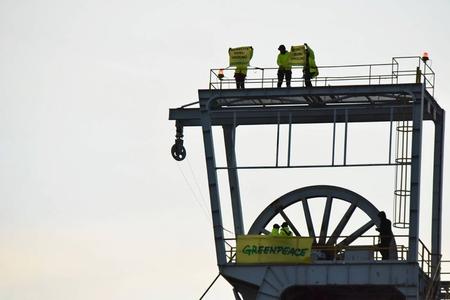A group of 12 Greenpeace activists, who were detained following a protest held on the mining tower in Nováky (Trenčín Region), will be prosecuted while in custody, according to a ruling issued by the district court in Prievidza on December 2.
The judge explained that if released, the accused could continue in their criminal activities.
However, the activists have challenged the decision, with their lawyers objecting to alleged bias on the part of the court. They are asking for the investigation to be moved outside the region, the TASR newswire reported.
The activists from Slovakia, the Czech Republic, Finland and Belgium are facing charges for “damaging and threatening the operation of a generally beneficial device in the form of complicity”, for which they could spend from one to five years in prison, the Sme daily reported.
The protest was calm and non-violent, Greenpeace says
The court decision to prosecute the activists while they are in custody is unprecedented, according to Greenpeace.

“Activists are not criminals who should be prosecuted in custody,” said Ivana Kohutková, head of Greenpeace Slovensko, in a statement, stressing that the activists calmly and without any violence protested against Hornonitrianske Bane Prievidza mining company which “has been a burden to the region and Slovakia for decades”.
Lukáš Opett from the Kolíková & Partners law firm said that the previous proceedings had not taken into consideration that by their activities the activists non-violently pursued their constitutional right to freedom of speech, with which they did not endanger any lives or the health of other people.
In his opinion, the current criminal prosecution and actions against the activists could be perceived as giving preference to protecting a private mining company’s property rather than the right to express one’s opinion.
Hornonitrianske Bane Prievidza informed earlier that the protest endangered 342 miners working underground since after the activists climbed the mining tower, the mining elevator could not move. As a result, a critical state had to be declared. The court says that mining had to be stopped for five hours, Sme wrote.
Greenpeace has rejected the claims that they threatened the lives of miners. The tower is used to transport extracted coal, while miners use other exits to leave the mine, it added.
Prime minister questions the court decision
Although PM Peter Pellegrini (Smer) has a different opinion on the importance of coal mining in the Upper Nitra region and does not like the ways the activists present their opinion, he questions the decision to take them into custody.
Although he respects court decisions, he has questioned this particular one, recalling the case when he considered it absurd to release the murderer of Filipino expat Henry Acorda.
“These decisions are only logical if everybody who is obviously dangerous and who commits crimes is in custody,” Pellegrini wrote on Facebook.
Greenpeace Slovensko welcomed the statement but stressed that they are not alone in calling for a halt to coal mining in Slovakia.
“Up to 64 percent of Slovaks want coal based energy in Slovakia to end, as a poll suggests,” said Kohutková, as quoted in the press release. “Moreover, as many as 80 percent of Slovakia’s citizens want the prime minister to support the transition of Upper Nitra to clean energy and economics.”
Though she admits that not everybody can understand this way of protesting, before such actions are taken, there are talks with local and national-level politicians. In this specific case, they carried out a test that revealed alarming values of arsenic in sediment found close to the outfalls of the mine waste-water from Hornonitrianske Bane Prievidza.
“The response of the competent bodies, both the mining company and the state, wasn’t sufficient,” Kohutková explained. “The problems of this region have been linked with the coal industry for decades and aren’t being solved in a way this region deserves.”
Meanwhile, Justice Minister Gábor Gál (Most-Híd) said that it is necessary to respect court decisions. Although he did not want to comment on the ongoing investigation from his position as justice minister, from his point of view as a normal person and lawyer, he said that the decision had surprised him, reported TASR.
General Prosecutor Jaromír Čižnár has asked for the file concerning the prosecution in connection with the request to remove the investigation from the regional prosecutor’s office in Trenčín and to review the steps taken by the law enforcement bodies, TASR wrote.


 Activists were protesting against coal mining. (source: Tomáš Halász/Greenpeace)
Activists were protesting against coal mining. (source: Tomáš Halász/Greenpeace)